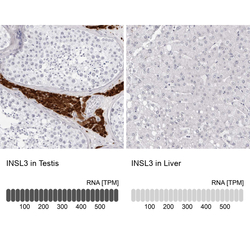Antibody data
- Antibody Data
- Antigen structure
- References [6]
- Comments [0]
- Validations
- Immunohistochemistry [1]
Submit
Validation data
Reference
Comment
Report error
- Product number
- HPA028615 - Provider product page

- Provider
- Atlas Antibodies
- Proper citation
- Atlas Antibodies Cat#HPA028615, RRID:AB_10600717
- Product name
- Anti-INSL3
- Antibody type
- Polyclonal
- Description
- Polyclonal Antibody against Human INSL3, Gene description: insulin-like 3 (Leydig cell), Alternative Gene Names: MGC119818, MGC119819, RLF, RLNL, Validated applications: IHC, Uniprot ID: P51460, Storage: Store at +4°C for short term storage. Long time storage is recommended at -20°C.
- Reactivity
- Human
- Host
- Rabbit
- Conjugate
- Unconjugated
- Isotype
- IgG
- Vial size
- 100 µl
- Concentration
- 0.1 mg/ml
- Storage
- Store at +4°C for short term storage. Long time storage is recommended at -20°C.
- Handling
- The antibody solution should be gently mixed before use.
Submitted references Partial rejuvenation of the spermatogonial stem cell niche after gender-affirming hormone therapy in trans women
Human immature testicular tissue organ culture: a step towards fertility preservation and restoration
Leydig Cells in Patients with Non-Obstructive Azoospermia: Do They Really Proliferate?
Feminising hormone therapy reduces testicular ACE-2 receptor expression: Implications for treatment or prevention of COVID-19 infection in men.
Cell context-specific expression of primary cilia in the human testis and ciliary coordination of Hedgehog signalling in mouse Leydig cells
The human testis-specific proteome defined by transcriptomics and antibody-based profiling
Delgouffe E, Silva S, Chalmel F, Cools W, Raets C, Tilleman K, T'Sjoen G, Baert Y, Goossens E
eLife 2025;13
eLife 2025;13
Human immature testicular tissue organ culture: a step towards fertility preservation and restoration
Younis N, Caldeira-Brant A, Chu T, Abdalla S, Orwig K
Frontiers in Endocrinology 2023;14
Frontiers in Endocrinology 2023;14
Leydig Cells in Patients with Non-Obstructive Azoospermia: Do They Really Proliferate?
Hauptman D, Perić M, Marić T, Bojanac A, Sinčić N, Zimak Z, Kaštelan Ž, Ježek D
Life 2021;11(11):1266
Life 2021;11(11):1266
Feminising hormone therapy reduces testicular ACE-2 receptor expression: Implications for treatment or prevention of COVID-19 infection in men.
Masterson JM, Bui C, Zhang Y, Yuan X, Huynh C, Jawanda H, Hasan W, Tourtellotte W, Luthringer D, Garcia MM
Andrologia 2021 Dec;53(11):e14186
Andrologia 2021 Dec;53(11):e14186
Cell context-specific expression of primary cilia in the human testis and ciliary coordination of Hedgehog signalling in mouse Leydig cells
Nygaard M, Almstrup K, Lindbæk L, Christensen S, Svingen T
Scientific Reports 2015;5(1)
Scientific Reports 2015;5(1)
The human testis-specific proteome defined by transcriptomics and antibody-based profiling
Djureinovic D, Fagerberg L, Hallström B, Danielsson A, Lindskog C, Uhlén M, Pontén F
MHR: Basic science of reproductive medicine 2014;20(6):476-488
MHR: Basic science of reproductive medicine 2014;20(6):476-488
No comments: Submit comment
Supportive validation
- Submitted by
- Atlas Antibodies (provider)
- Enhanced method
- Orthogonal validation
- Main image

- Experimental details
- Immunohistochemistry analysis in human testis and liver tissues using HPA028615 antibody. Corresponding INSL3 RNA-seq data are presented for the same tissues.
- Sample type
- Human
- Protocol
- Protocol
 Explore
Explore Validate
Validate Learn
Learn Immunohistochemistry
Immunohistochemistry